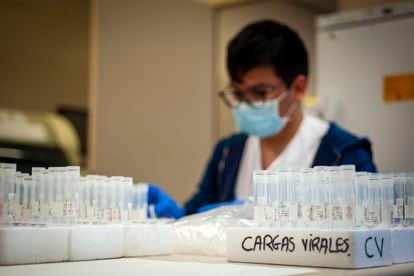Spain’s struggle to genetically sequence coronavirus jeopardizes fight against new strains
Experts say the country will not be able to reach the EU’s goal of testing 5% of all positive cases until the summer. The approach is key to creating better strategies to stop the spread of the virus

/cloudfront-eu-central-1.images.arcpublishing.com/prisa/KWISZTMYUDWJTQEGYISVLKRVT4.JPG)
Spain is not likely to reach the European Commission’s goal of genetically sequencing at least 5% of all positive coronavirus cases before summer. That’s according to two experts consulted by EL PAÍS. This goal is considered key to fighting against new, more-contagious strains of the virus, such as those so far detected in the United Kingdom, Brazil and South Africa. These variants are more dangerous as they are not only more contagious, but can also cause more serious illness and, in the case of the strain from South Africa, reduce the effectiveness of current Covid-19 vaccines.
On Monday, Fernando Simón, the director of the Health Ministry’s Coordination Center for Health Alerts (CCAES), said that this 5% is a “relative figure” that depends on the current incidence rate. For example, 5% of the 7,000 infections reported last Friday, would equate to genetically sequencing 350 cases. But this same number would represent less than 1% of the 44,000 new cases reported on January 20.
Sequencing is important because it allows us to know what variants are circulating in the population and to detect new ones that could appearTomás Pumarola, head of microbiology at Vall d’Hebron hospital in Barcelona
In other words, Spain must have the capacity to genetically sequence 5% of all positive cases in a sustained manner regardless of whether there are spikes in infections, something that the country cannot do, Simón admitted on Monday. “The truth is few countries can do it given the current situation, with the exception of the United Kingdom, Denmark and a few others,” he said.
Sequencing the virus allows a country to detect new mutations and anticipate any changes it may cause with respect to public health. The European Commission highlighted last Wednesday that member states need to boost their capacity to “identify new variants, monitor their spread in populations and screen their impact on transmissibility.” To achieve this goal, and to develop specialized tests for new variants, the EU has announced it will provide at least €75 million in funding.
“Sequencing is important because it allows us to know what variants are circulating in the population and to detect new ones that could appear,” says Tomás Pumarola, the head of microbiology at Vall d’Hebron hospital in Barcelona. “If we know this, we can forecast how they will affect epidemiological curves and this is key to designing better strategies to tackle the pandemic.”
The process to boost the capacity of Spanish hospitals and research centers to sequence the virus is already underway, but it will take time, say experts. “It is a feasible objective, but not one that can be immediately implemented. Right now Spain does not have the capacity to make the leap quickly,” says Fernando González Candela, a researcher at the Foundation for the Promotion of Health and Biomedicine (Fisabio) in Valencia. “We have to buy equipment, establish protocols, train staff… It is very specialized training that takes time. It is not going to be implemented at the same time [across Spain]. Some regions with big hospitals that can already sequence could reach the goal in a few weeks, while others will need much more time,” he adds. “Ideally, the foundation of the system could be set up in four or five months.”

According to Pumarola, Barcelona’s Vall d’Hebron hospital has been genetically sequencing around 20 cases every week since last March. “Now we would have to do around 200. At the moment we are at 150,” he says. Jesús Otero, the head of the National Microbiology Center (CNM), says the research center was sequencing “100 to 200 cases a week” at the start of the pandemic, and is now planning to scale up operations. “In the first phase of scaling up, we are on the point of being able to sequence 750 cases [a week] and we could reach 1,500,” says Oteo.
But according to Juan Carlos Galán, the head of virology at the Ramón y Cajal hospital in Madrid, the entire healthcare system “is not able to reach [the goal of sequencing] 5%” of cases. Like other experts, Galán argues that “bureaucratic and logistical problems” must be overcome, and politicians must actively promote the cause.
Specialized tests
Jordi Vila Estapé, the president of the Spanish Society of Infectious Diseases and Clinical Microbiology, explains that until the arrival of the coronavirus, Spain was focused on researching and diagnosing very specific diseases, such as antibiotic-resistant bacteria and mutations in the HIV and hepatitis C viruses. “As well as monitoring the flu every season, for example,” says Vila Estapé. “But in terms of figures, the volume was a lot smaller than what is being proposed now. Sequencing now has much greater weight in epidemiological monitoring.”
One sign of this is that there are no public figures on Spain’s real sequencing capacity, although several sources put it at around 500 samples a week. As González Candelas explains, this figure is a long way off from reaching the goal of genetically sequencing 5% of all coronavirus cases. “A hospital can [genetically sequence] many cases in a specific week. It’s another thing if it has to maintain this same rhythm for a long period of time. And that is what is being asked for now.”
The new strategy from the central Health Ministry, outlined in a document updated on February 12, currently reduces the goal for genetic sequencing to 1% of all positive cases. But the document also sets down a plan to boost Spain’s sequencing capacity with a “network of leading laboratories” and centers “in every region.” This network will be coordinated by the Health Ministry, while the CNM will act as the “central node” taking care of the scientific and technical aspects of the plan.
Despite Spain’s shortcomings, experts disagree that the country has a much lower capacity than the rest of Europe. “The United Kingdom, which sequences 10%, is always mentioned. But this is a special case. If we look at global databases, Spain is doing more or less the same sequencing as France, Germany and Italy,” says Galán.
Spain studying seven variants of the coronavirus
English version by Melissa Kitson.
/cloudfront-eu-central-1.images.arcpublishing.com/prisa/4MWOZQF2WJSO3GI4M6EROKRVX4.JPG)
/cloudfront-eu-central-1.images.arcpublishing.com/prisa/SB5IMN7PWNHDTDNW6F73MUC3K4.jpg)










































